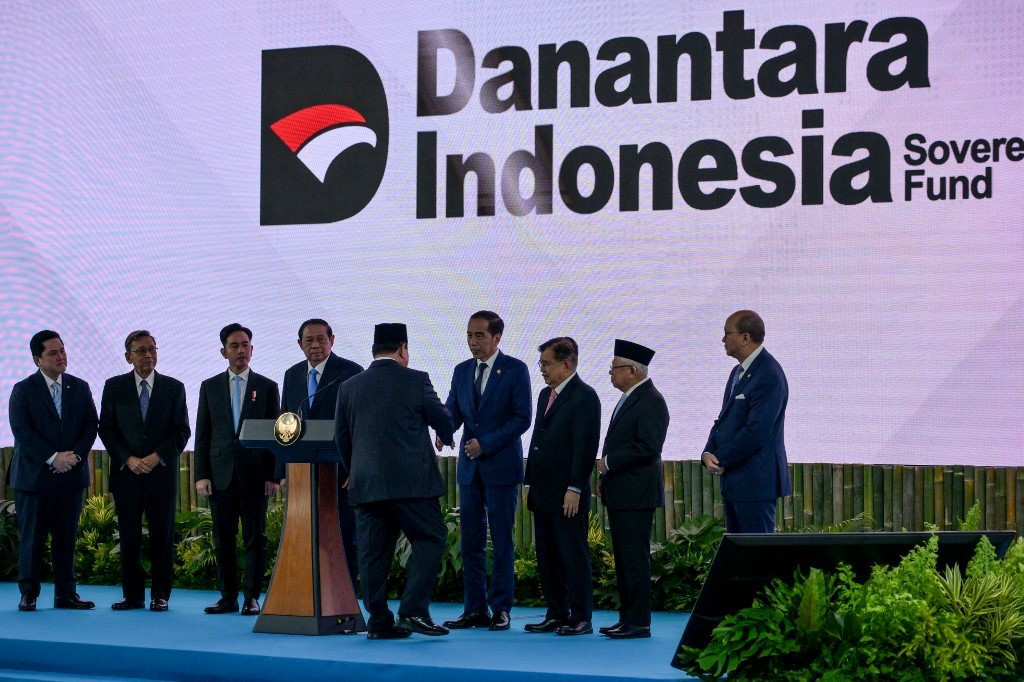News
Danantara launches with leadership shake-up
Tenggara Strategics March 5, 2025 President Prabowo Subianto (center, back turned) shakes hands with his predecessor Joko “Jokowi“ Widodo on Feb. 24, 2025, during the launch of the Daya Anagata Nusantara (Danantara) sovereign wealth fund in Jakarta. (AFP/Bay Ismoyo)
President Prabowo Subianto (center, back turned) shakes hands with his predecessor Joko “Jokowi“ Widodo on Feb. 24, 2025, during the launch of the Daya Anagata Nusantara (Danantara) sovereign wealth fund in Jakarta. (AFP/Bay Ismoyo)
President Prabowo Subianto has officially launched the highly anticipated Daya Anagata Nusantara (Danantara) Investment Management Agency, announcing an ambitious initial investment wave totaling Rp 325 trillion (US$20 billion) across 20 strategic projects. Through these projects, President Prabowo reaffirmed the agency’s commitment to long-term sustainable growth aimed at strengthening Indonesia’s economic foundation.
The 20 strategic projects span multiple sectors, including the expansion of Indonesia’s downstream industries, advancements in artificial intelligence (AI) research, and the construction of key infrastructure such as data centers, oil refineries, and petrochemical plants. The investments will also be directed toward agriculture, aquaculture, and renewable energy projects.
The launch event provided clarity on Danantara’s organizational structure and its role within Indonesia’s state-owned enterprises (SOE) landscape. The agency will oversee some of the nation’s most prominent SOEs, including the electricity company (PLN), energy company Pertamina, telecommunication company Telkom Indonesia, mining company Mineral Industry Indonesia (MIND ID), Bank Mandiri, Bank BNI, and Bank BRI. With these assets under its management, Danantara is projected to control approximately US$900 billion in assets, positioning it among the world’s largest sovereign wealth funds (SWFs).
Investment Minister and newly appointed Danantara CEO Rosan Roeslani reassured investors that the Indonesian Investment Authority (INA) would remain independent and separate from Danantara’s management. This clarification was particularly significant for foreign investors who had committed funds to INA based on assurances of its autonomy from direct government influence.
During the inauguration, key leadership positions within Danantara were officially announced. Pandu Patria Sjahrir, initially rumored to take on the role of Chief Operating Officer (COO), was instead named Chief Investment Officer (CIO), while Dony Oskaria was confirmed as COO. Meanwhile, Muliaman Darmansyah Hadad, who had been designated as Danantara’s chairman in October 2024, was appointed deputy chairman of the agency’s supervisory board. The role of supervisory board chairman was assigned to Erick Thohir, the current Minister of State-Owned Enterprises (SOEs).
These appointments are believed to reflect behind-the-scenes political negotiations over Danantara’s management structure. Erick Thohir’s appointment as supervisory board chairman is seen as a compromise, following his opposition to the original blueprint for Danantara’s establishment. The initial proposal suggested that Danantara would assume several functions traditionally held by the SOEs Ministry, raising concerns about a potential reduction in Erick’s influence. In response, the SOEs Ministry delayed revisions to the SOEs Law—an essential legislative change necessary for Danantara to operate effectively.
Further complicating the leadership dynamics, a faction led by former Bank Indonesia (BI) officials, including Burhanuddin Abdullah, had initially played a major role in shaping Danantara’s framework. However, over the past year, this group’s influence has waned, culminating in Muliaman’s reassignment from chairman to supervisory board.
Even after its launch, Danantara remains a focal point of political maneuvering. President Prabowo is now involving religious civil society groups as special advisors to the agency, a move widely interpreted as a gesture of gratitude for their support during his presidential campaign. His administration has previously demonstrated favor toward these groups, as seen in the recent granting of mining concessions to Nahdlatul Ulama (NU).
According to statements from the Presidential Communications Office, Prabowo has reached out to NU, Muhammadiyah, and the Indonesian Bishops’ Conference (KWI) to explore their potential advisory roles within Danantara. The rationale behind this initiative is that, as Danantara oversees Indonesia’s vast state-owned assets, its management must be closely aligned with public interests. Given the agency’s immense scale, any financial mismanagement could have significant national repercussions. In this context, religious civil societies are being positioned as representatives of the people, ensuring that Danantara operates with transparency and accountability to the broader public.
What we've heard
A source from the Presidential Palace revealed that the replacement of Muliaman Darmansyah Hadad by Rosan Perkasa Roeslani as the new head of Danantara was decided around early February, shortly after the House of Representatives (DPR) passed the State-Owned Enterprises (SOE) Bill into law. The same applies to the removal of Kaharuddin Djenod, who had previously been appointed as Deputy Head of Danantara’s Supervisory Board. Another source mentioned that Djenod was not widely favored within Danantara, which is why he was replaced by Pandu Sjahrir, who is generally more acceptable to various groups.

